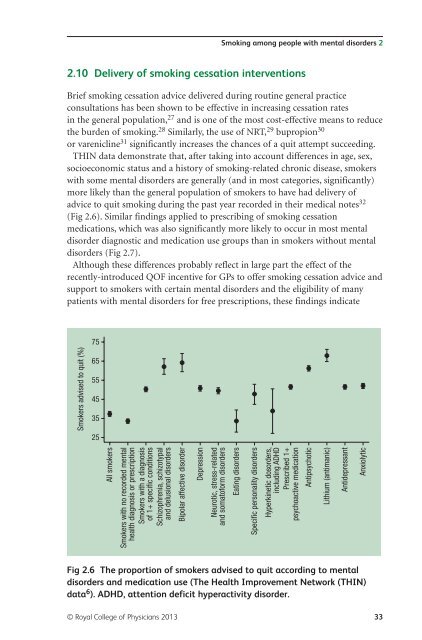Smoking and mental health - NCSCT
Smoking and mental health - NCSCT
Smoking and mental health - NCSCT
Create successful ePaper yourself
Turn your PDF publications into a flip-book with our unique Google optimized e-Paper software.
<strong>Smoking</strong> among people with <strong>mental</strong> disorders 2<br />
2.10 Delivery of smoking cessation interventions<br />
Brief smoking cessation advice delivered during routine general practice<br />
consultations has been shown to be effective in increasing cessation rates<br />
in the general population, 27 <strong>and</strong> is one of the most cost-effective means to reduce<br />
the burden of smoking. 28 Similarly, the use of NRT, 29 bupropion 30<br />
or varenicline 31 significantly increases the chances of a quit attempt succeeding.<br />
THIN data demonstrate that, after taking into account differences in age, sex,<br />
socioeconomic status <strong>and</strong> a history of smoking-related chronic disease, smokers<br />
with some <strong>mental</strong> disorders are generally (<strong>and</strong> in most categories, significantly)<br />
more likely than the general population of smokers to have had delivery of<br />
advice to quit smoking during the past year recorded in their medical notes 32<br />
(Fig 2.6). Similar findings applied to prescribing of smoking cessation<br />
medications, which was also significantly more likely to occur in most <strong>mental</strong><br />
disorder diagnostic <strong>and</strong> medication use groups than in smokers without <strong>mental</strong><br />
disorders (Fig 2.7).<br />
Although these differences probably reflect in large part the effect of the<br />
recently-introduced QOF incentive for GPs to offer smoking cessation advice <strong>and</strong><br />
support to smokers with certain <strong>mental</strong> disorders <strong>and</strong> the eligibility of many<br />
patients with <strong>mental</strong> disorders for free prescriptions, these findings indicate<br />
Smokers advised to quit (%)<br />
75<br />
65<br />
55<br />
45<br />
35<br />
25<br />
All smokers<br />
Smokers with no recorded <strong>mental</strong><br />
<strong>health</strong> diagnosis or prescription<br />
Smokers with a diagnosis<br />
of 1+ specific conditions<br />
Schizophrenia, schizotypal<br />
<strong>and</strong> delusional disorders<br />
Bipolar affective disorder<br />
Depression<br />
Neurotic, stress-related<br />
<strong>and</strong> somatoform disorders<br />
Eating disorders<br />
Specific personality disorders<br />
Hyperkinetic dosorders,<br />
including ADHD<br />
Prescribed 1+<br />
psychoactive medication<br />
Antipsychotic<br />
Lithium (antimanic)<br />
Antidepressant<br />
Anxiolytic<br />
Fig 2.6 The proportion of smokers advised to quit according to <strong>mental</strong><br />
disorders <strong>and</strong> medication use (The Health Improvement Network (THIN)<br />
data 6 ). ADHD, attention deficit hyperactivity disorder.<br />
© Royal College of Physicians 2013 33














